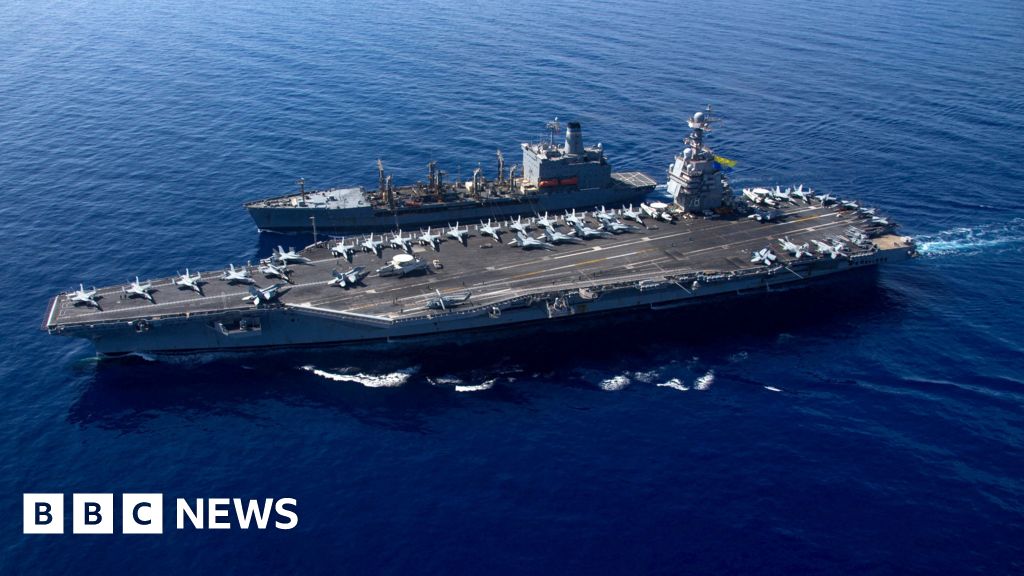In recent developments that have significantly heightened tensions in the Caribbean region, Venezuela’s President Nicolás Maduro has sharply criticized the United States’ military activities near his country, accusing the US of "fabricating a new war." This accusation follows the US decision to deploy the USS Gerald R Ford, the world’s largest aircraft carrier, to the Caribbean—a move that marks a substantial escalation in American military presence and firepower in the region.
The USS Gerald R Ford is a formidable warship capable of carrying up to 90 aircraft, and its deployment signals a major increase in the US’s operational capabilities in an area that includes Central America, South America, and the Caribbean. The Pentagon confirmed that the carrier’s arrival is intended to bolster efforts to disrupt narcotics trafficking and dismantle transnational criminal organizations operating in the hemisphere. According to Pentagon spokesperson Sean Parnell, the additional military assets will "enhance and augment existing capabilities" in the US’s ongoing campaign against drug traffickers.
This military buildup comes amid a series of US air strikes targeting vessels suspected to be involved in drug trafficking. Since early September, the US has conducted at least ten air strikes in the Caribbean and nearby waters, reportedly killing dozens of individuals linked to illicit narcotics operations. One such operation resulted in the killing of six men associated with Tren de Aragua, a Venezuelan-based transnational criminal group designated as a terrorist organization by the US State Department.
Despite these actions, Maduro has vehemently denied allegations that he leads or supports drug trafficking operations. He accused the US of seeking to manufacture an "eternal war" to justify increased intervention in Venezuela. Speaking to state media, Maduro condemned what he described as US fabrications aimed at justifying military aggression. His concerns reflect a widespread fear within Venezuela that the US’s military buildup may be a prelude to an attempt to oust him from power, especially given the historically antagonistic relationship between him and former US President Donald Trump.
The political context surrounding these tensions is critical. The US, along with many other countries, does not recognize Maduro as the legitimate leader of Venezuela. After the country's 2024 presidential election, which many observers and opposition groups dismissed as neither free nor fair, Maduro’s claim to power has been widely challenged. Opposition tallies reportedly showed a landslide victory for Maduro’s rival, but the official results declared Maduro the winner. This political dispute has left Venezuela in a state of uncertainty and international contention, with the US and its allies backing opposition figures.
Though Venezuela’s role in the regional drug trade is relatively minor compared to drug-producing nations such as Colombia, US officials argue that the Venezuelan government plays a critical role in facilitating the transit of illegal narcotics. Secretary of State Marco Rubio stated that the Maduro regime is effectively a "transshipment organization," allowing cocaine from Colombia and other sources to pass through Venezuelan territory—sometimes with the regime’s direct involvement. Rubio’s comments underscore the US administration’s justification for its increased military presence and actions in the region.
However, some military analysts question the necessity of such a large-scale deployment to intercept drug shipments. Intercepting narcotics at sea typically does not require the deployment of a massive carrier strike group, raising questions about the true intentions behind the US’s military buildup. Critics argue that the scale of the deployment suggests objectives beyond drug interdiction, possibly aimed at exerting pressure on Maduro’s government and signaling US resolve.
Indeed, experts and regional observers have voiced concerns about the legality and implications of the US air strikes. Many have condemned the strikes as potentially unlawful, arguing that they may violate international law by using force in foreign waters without the consent of the host nations. The strikes have raised questions about sovereignty and the appropriate use of military power in combating drug trafficking.
Dr. Christopher Sabatini, a senior fellow at Chatham House specializing in Latin America, described the US military actions as a form of psychological warfare intended to "strike fear" into Maduro’s inner circle and the Venezuelan military. According to Sabatini, while a full-scale invasion appears unlikely, the military buildup and strikes serve as a strategic signal aimed at destabilizing Maduro’s regime and potentially catalyzing internal opposition.
President Trump has publicly entertained the possibility of escalating military actions beyond air and sea operations. He mentioned "land action" in Venezuela, suggesting that the US might consider deploying ground forces to curb drug trafficking and possibly influence the political situation. Trump claimed that the US had effectively stopped drug shipments by sea and was preparing to do the

